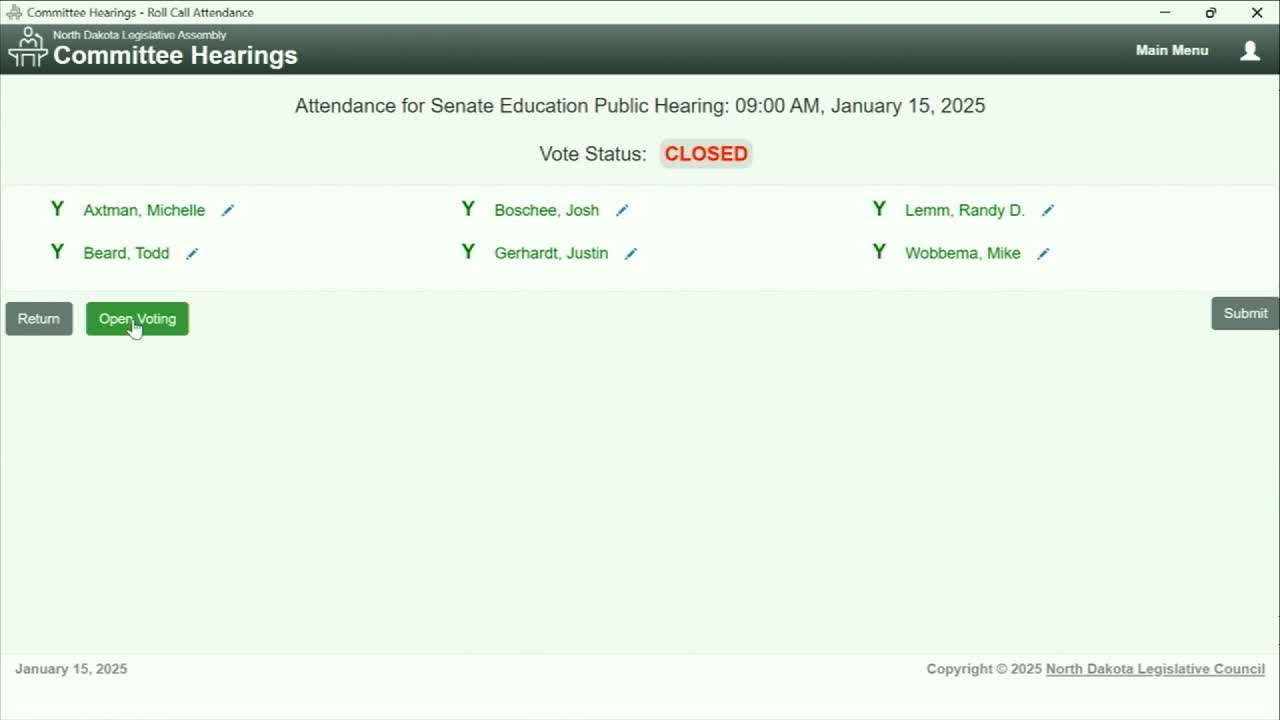Senate committee hears bill to require cardiac arrest education for student athletes
Get AI-powered insights, summaries, and transcripts
Subscribe
Summary
Senate Education Committee members on Thursday heard testimony on Senate Bill 2099, which would add a section to chapter 15.1 of the North Dakota Century Code requiring cardiac arrest prevention education for student athletes, their parents and coaches and requiring coaches to complete cardiac arrest training and hold informational meetings before each athletic season.
Senate Education Committee members on Thursday heard testimony on Senate Bill 2099, which would add a section to chapter 15.1 of the North Dakota Century Code requiring cardiac arrest prevention education for student athletes, their parents and coaches and requiring coaches to complete cardiac arrest training and hold informational meetings before each athletic season.
The bill—s sponsor, Senator Tim Mathern, said the measure was prompted by student athletes and by Jacob Willis, a student and the bill—s primary author. "This bill proposes a new section in chapter 15.1 of the North Dakota century code to establish a cardiac arrest prevention and education requirement for student athletes and their coaches," Mathern said, describing requirements that would include materials for students and parents, coach training in CPR and AED use, and a requirement that coaches hold informational meetings before each season.
Supporters told the committee the measure addresses sudden cardiac arrest, which they called the leading cause of death among student athletes. "Every 3 days, a student in the United States loses their life to sudden cardiac arrest, making it the leading cause of death for this group," said Jacob Willis, who testified remotely and identified himself as a college student and a volunteer with Simon—s Heart. Willis told the committee a two-year study that tracked 132 cases of sudden cardiac arrest during athletic competition recorded a survival rate of less than 50 percent, and said survival improves sharply when both CPR and an automated external defibrillator are used promptly: "Survival rates of out of hospital sudden cardiac arrest incidents increased by more than 400% when both CPR and an AED are used promptly at the scene." Willis said some short, free SCA-specific resources (he cited a roughly seven-minute video from Simon—s Heart) could be used alongside CPR/AED training.
Committee members and other testifiers focused on which state agency should lead development and approval of training and materials. "The Department of Public Instruction is not equipped with the expertise in cardiac arrest prevention or health related matters," said Robin Lang, assistant director in the Office of Educational Improvement and Support at the Department of Public Instruction. Lang recommended that the Department of Health and Human Services, which she said has health-content experts, be assigned primary responsibility for developing the medical content while DPI remain a distribution partner: "This collaborative approach ensures that the information provided reflects the most current medical standards and practices while allowing the Department of Public Instruction to continue its focus on the primary responsibilities in education."
Chris Ann Norby Jonner, in-house legal counsel for the North Dakota School Boards Association, testified in a neutral capacity and expressed concern about placing operational responsibilities and potential legal obligations on coaches and school employees. She noted the bill would require coaches to complete a superintendent-approved cardiac arrest training course and to hold informational meetings that could include presentations by physicians and athletic trainers. "We are concerned about the responsibility being placed on school district employees," Norby Jonner said, and urged work on training logistics and funding because local districts and small/rural schools may lack ready access to medical experts.
Committee members pressed for details about existing requirements: Senator Axman said many coaches already undertake CPR and AED training, noting that CPR/AED certification is required every two years in his experience. Senator Gearhart asked whether listing symptoms in the bill duplicated work the superintendent of public instruction or a medical agency would do; sponsor Mathern said the bill aimed to ensure minimum topics are included while allowing the superintendent (or other designated agency) to work out details. Mathern asked the committee to give the bill a due-pass recommendation.
The committee accepted testimony from proponents, opponents and neutral parties and then closed the hearing on SB 2099; the transcript does not record a committee vote on the bill during the session.
Clarifying details recorded in the hearing included that the bill would add a new section in chapter 15.1 of the North Dakota Century Code, that sponsors envision coach training to include CPR and AED education, that some SCA-specific modules exist online (including a roughly seven-minute video cited by the student proponent), and that concerns were raised about which agency should approve or develop training materials and about the cost and availability of physician-led presentations. The Department of Public Instruction said it typically co-develops or co-approves school health materials with the Department of Health and Human Services and that DPI would prefer a partnership rather than sole responsibility for content development.
Next steps: the bill received a public hearing with proponents and opponents and the sponsor requested a due pass recommendation; the committee did not record a final committee vote during the session recorded in the transcript.
